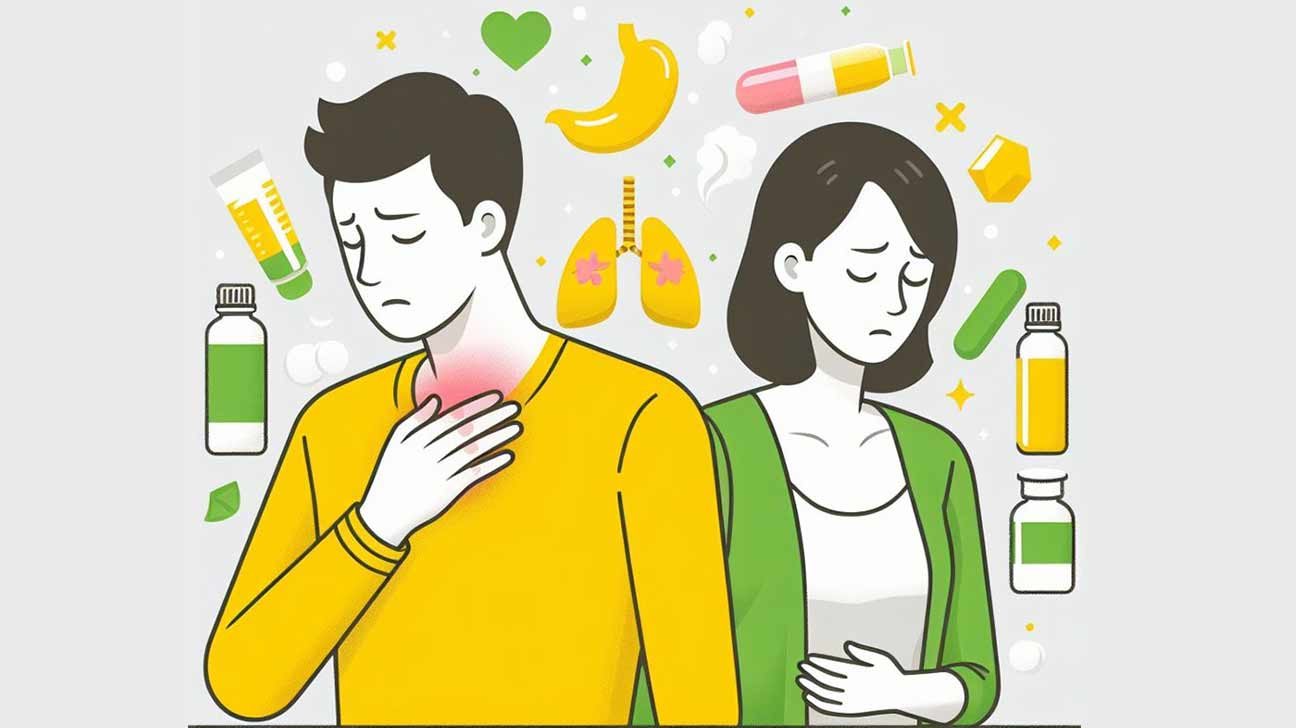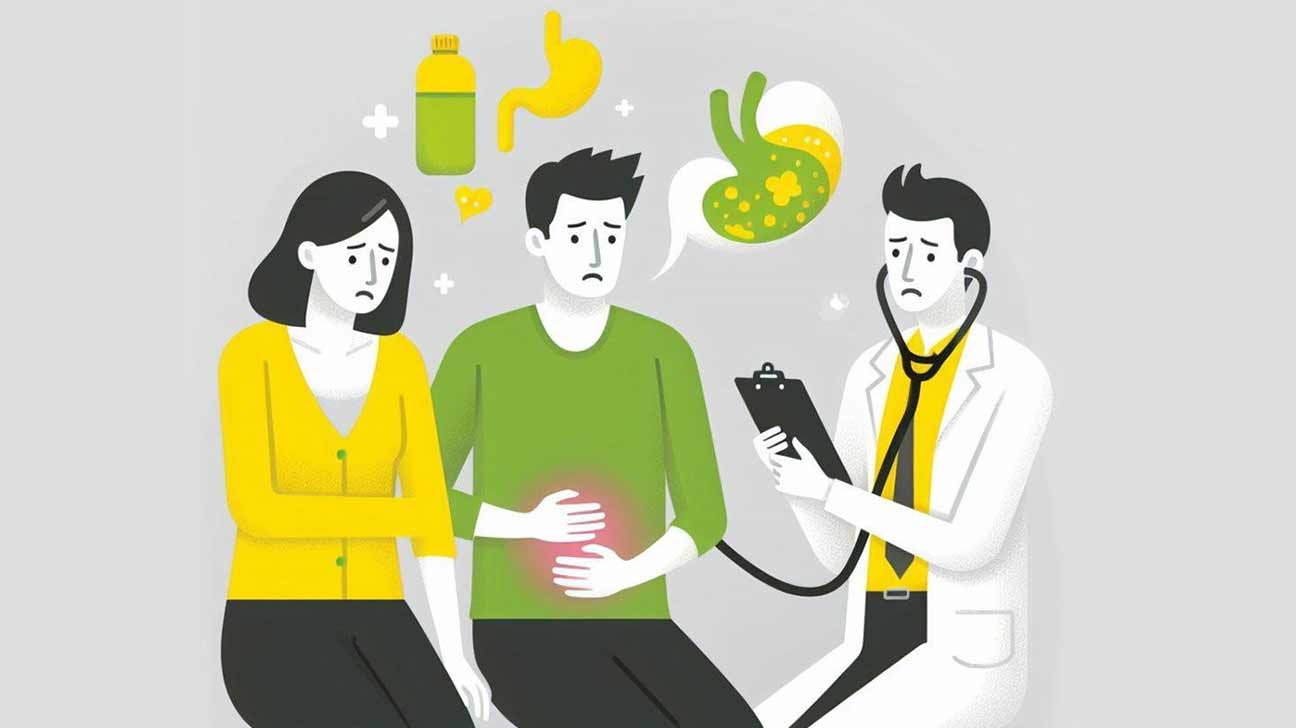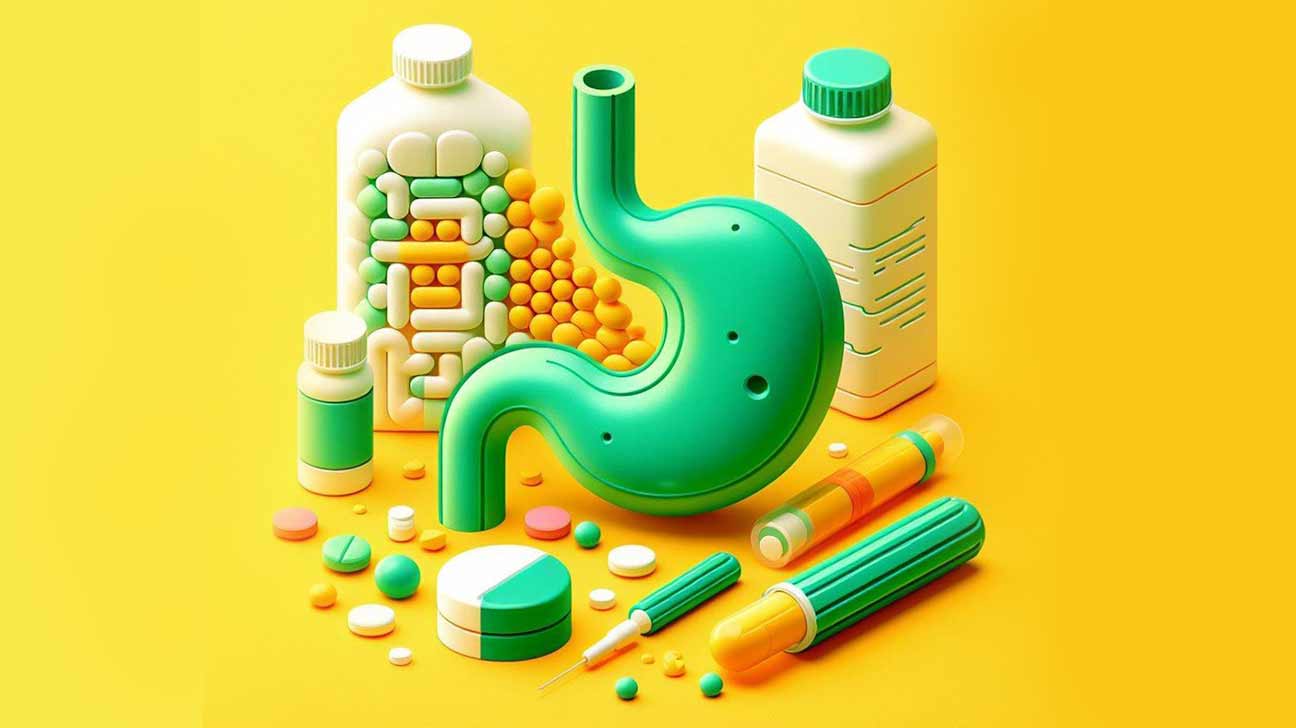Here’s a detailed overview of the causes of acid reflux and its treatment options.
Acid Reflux: Overview
Acid reflux, also known as gastroesophageal reflux disease (GERD) when chronic, occurs when stomach acid flows back into the esophagus. This can lead to symptoms such as heartburn, regurgitation, and discomfort in the chest or throat.
Causes of Acid Reflux
Acid reflux can occur due to various factors, including:
1. Lower Esophageal Sphincter (LES) Dysfunction
The LES is a ring of muscle at the bottom of the esophagus that acts as a valve between the esophagus and the stomach. If the LES is weak or relaxes inappropriately, acid from the stomach can flow back into the esophagus. Factors that can contribute to LES dysfunction include:
- Obesity: Excess weight can put pressure on the stomach, pushing acid into the esophagus.
- Pregnancy: Hormonal changes and increased abdominal pressure can affect LES function.
- Hiatal Hernia: A condition where part of the stomach pushes through the diaphragm into the chest cavity, weakening the LES.
2. Dietary Factors
Certain foods and beverages can trigger acid reflux symptoms, including:
- Spicy Foods: Can irritate the esophagus.
- Fatty Foods: Slow down digestion and may increase pressure on the LES.
- Citrus Fruits: High acidity can lead to heartburn.
- Chocolate: Contains theobromine, which can relax the LES.
- Caffeinated Beverages: Coffee and tea may increase stomach acid production.
- Alcohol: Can relax the LES and increase acid production.
3. Lifestyle Factors
Certain habits can contribute to acid reflux, such as:
- Smoking: Can weaken the LES and reduce saliva production, which helps neutralize stomach acid.
- Overeating: Large meals can increase stomach pressure.
- Lying Down After Eating: This can allow acid to flow back into the esophagus more easily.
4. Medical Conditions
Some health issues may increase the likelihood of developing acid reflux:
- Asthma: Increased pressure in the abdomen due to asthma coughing.
- Diabetes: Delayed stomach emptying (gastroparesis) can cause acid reflux.
- Connective Tissue Disorders: Conditions like scleroderma can affect muscle function in the esophagus.
Symptoms of Acid Reflux
Common symptoms include:
- Heartburn: A burning sensation in the chest, usually after eating or at night.
- Regurgitation: A sour or bitter taste in the mouth due to backflow of stomach contents.
- Difficulty Swallowing: Sensation of food getting stuck in the throat or chest.
- Chronic Cough or Throat Clearing: Often mistaken for allergies or respiratory issues.
- Sore Throat or Hoarseness: Due to acid irritating the throat.
Diagnosis
Diagnosis of acid reflux typically involves:
- Medical History: Discussing symptoms and lifestyle factors with a healthcare provider.
- Physical Examination: A thorough examination to check for complications.
- Tests:
- Endoscopy: A flexible tube with a camera is inserted to view the esophagus and stomach.
- pH Monitoring: Measures the acidity in the esophagus over 24 hours.
- Esophageal Manometry: Evaluates the function of the esophagus and LES.
Treatment Options
Treatment for acid reflux often includes lifestyle changes, medications, and in some cases, surgery.
1. Lifestyle Changes
- Dietary Modifications: Avoid trigger foods and eat smaller, more frequent meals.
- Weight Management: Losing excess weight can significantly reduce symptoms.
- Elevating the Head of the Bed: Sleeping with the head elevated can prevent nighttime symptoms.
- Avoiding Smoking and Alcohol: These can worsen symptoms.
- Avoiding Tight Clothing: Clothing that constricts the abdomen can increase pressure.
2. Medications
- Antacids: Over-the-counter medications like Tums or Rolaids neutralize stomach acid for quick relief.
- H2 Receptor Antagonists: Medications like ranitidine (Zantac) and famotidine (Pepcid) reduce acid production.
- Proton Pump Inhibitors (PPIs): Stronger medications such as omeprazole (Prilosec) and esomeprazole (Nexium) block acid production and promote healing.
- Prokinetics: Medications like metoclopramide can help strengthen the LES and speed up stomach emptying.
3. Surgery
For individuals who do not respond to lifestyle changes or medications, surgical options may be considered:
- Fundoplication: A procedure that wraps the top of the stomach around the LES to prevent acid reflux.
- LINX Device: A ring of magnetic beads placed around the LES to help keep it closed.
Conclusion
Acid reflux is a common condition that can significantly impact quality of life. Identifying triggers and adopting lifestyle modifications are crucial in managing symptoms. For persistent cases, consulting a healthcare professional for a personalized treatment plan is essential.
Additional Resources
For further information on acid reflux, consider visiting reputable organizations like:
- American Gastroenterological Association
- Mayo Clinic – GERD
- National Institute of Diabetes and Digestive and Kidney Diseases (NIDDK)
If you have any specific questions or need additional information, feel free to ask!
10 Foods to Avoid with Acid Reflux
Here are ten foods that are commonly advised to avoid if you suffer from acid reflux, along with brief explanations for each:
1. Spicy Foods
Spices like chili powder, black pepper, and hot sauces can irritate the esophagus and trigger heartburn symptoms.
2. Fatty Foods
High-fat foods, such as fried foods, fatty cuts of meat, and full-fat dairy products, can relax the lower esophageal sphincter (LES) and delay stomach emptying, increasing the risk of reflux.
3. Citrus Fruits
Fruits like oranges, lemons, and grapefruits are highly acidic and can irritate the esophagus, leading to heartburn and discomfort.
4. Tomato-Based Products
Tomato sauces, ketchup, and salsa are also acidic and can trigger reflux symptoms in many individuals.
5. Chocolate
Chocolate contains caffeine and theobromine, both of which can relax the LES, leading to increased acid reflux.
6. Mint
Peppermint and spearmint can relax the LES, potentially worsening acid reflux symptoms. It’s best to avoid mint-flavored products, including gum and candies.
7. Caffeinated Beverages
Coffee, tea, and sodas contain caffeine, which can increase stomach acid production and relax the LES, leading to reflux.
8. Alcohol
Alcoholic beverages can irritate the esophagus and relax the LES, making it easier for stomach acid to flow back into the esophagus.
9. Carbonated Drinks
Fizzy beverages can cause bloating and increase pressure in the stomach, which may lead to reflux. The bubbles in carbonated drinks can also expand, pushing stomach contents up.
10. Processed and Fast Foods
These foods are often high in unhealthy fats, sugars, and preservatives, which can exacerbate acid reflux symptoms. They can also slow down digestion, leading to increased acid production.
Conclusion
Avoiding these foods can help manage acid reflux symptoms and improve your quality of life. It’s also beneficial to keep a food diary to identify specific triggers, as individual responses can vary. If you have persistent symptoms, consult with a healthcare professional for personalized advice and treatment options.
If you need more information or tips on managing acid reflux, feel free to ask!

What is Acid Reflux ?
Acid reflux, also known as gastroesophageal reflux disease (GERD), is a digestive disorder that occurs when stomach acid or, occasionally, stomach content, flows back into the esophagus. The esophagus is the tube that carries food from the mouth to the stomach.
Normally, a ring-like muscle called the lower esophageal sphincter (LES) acts as a valve, preventing the stomach contents from flowing backward into the esophagus. In individuals with acid reflux, the LES may weaken or relax abnormally, allowing stomach acid to irritate the lining of the esophagus.
Common Symptoms of Acid Reflux
- Heartburn: A burning sensation or discomfort in the chest, often after eating.
- Regurgitation: The feeling of stomach contents coming back up into the throat or mouth.
- Chest pain: This can sometimes be mistaken for heart-related chest pain, but it is typically a burning discomfort.
- Difficulty swallowing: A sensation of food sticking in the throat or a feeling of a lump in the throat.
- Chronic cough: A persistent cough, often worse at night, that may be caused by stomach acid irritating the throat.
- Hoarseness or sore throat: Irritation of the vocal cords can lead to hoarseness or a persistent sore throat.
- Belching: Excessive burping, often with a sour taste.
- Nausea: Some individuals may experience nausea or a sour taste in the mouth.
- Dyspepsia: General discomfort or pain in the upper abdomen, often associated with bloating.
Causes of Acid Reflux
Acid reflux occurs when the lower esophageal sphincter (LES), a muscular ring that separates the esophagus from the stomach, doesn’t function properly. This allows stomach acid to flow back into the esophagus, causing irritation. Several factors can contribute to the development of acid reflux:
- Hiatal Hernia: A hiatal hernia occurs when the upper part of the stomach protrudes through the diaphragm into the chest cavity, affecting the function of the LES.
- Weak Lower Esophageal Sphincter (LES): If the LES is weak or relaxes inappropriately, it may allow stomach acid to flow back into the esophagus.
- Obesity: Excess weight, especially around the abdominal area, can put pressure on the stomach and LES, increasing the risk of acid reflux.
- Pregnancy: Hormonal changes and pressure on the stomach during pregnancy can contribute to acid reflux.
- Certain Foods and Drinks: Certain types of food and beverages can relax the LES or increase stomach acid production, including fatty foods, spicy foods, citrus fruits, tomatoes, chocolate, caffeine, and alcohol.
- Smoking: Smoking can weaken the LES and contribute to the development of acid reflux.
- Lying Down After Eating: Going to bed or lying down shortly after a meal can allow stomach acid to flow back into the esophagus more easily.
- Large Meals: Eating large meals can put increased pressure on the stomach, potentially leading to acid reflux.
- Certain Medications: Some medications, such as certain types of muscle relaxers, blood pressure medications, and aspirin, can contribute to acid reflux.
- Snacking Before Bed: Late-night snacks or meals close to bedtime can increase the risk of acid reflux symptoms during the night.
- Stress and Lack of Sleep: Stress and insufficient sleep can affect digestive health and contribute to acid reflux symptoms.
Diagnosis
The diagnosis of acid reflux involves a healthcare provider assessing your symptoms and medical history. In some cases, they may perform tests to confirm the presence of acid reflux or to rule out other conditions. Common diagnostic methods include:
- Patient History: The doctor will ask about your symptoms, their frequency and duration, as well as any factors that may trigger or worsen them.
- Physical Examination: A physical examination may be conducted to check for signs of acid reflux or other related conditions.
- Trial of Medications: If symptoms are suggestive of acid reflux, a doctor may prescribe medication (such as proton pump inhibitors or H2 blockers) to see if there is improvement. If symptoms respond positively, it may support the diagnosis.
- Endoscopy: This involves using a flexible tube with a camera (endoscope) to examine the esophagus and stomach, allowing the doctor to identify any inflammation or abnormalities.
- pH Monitoring: A test to measure the acidity levels in the esophagus over a period of time, helping to assess the frequency and duration of acid reflux episodes.
- Esophageal Manometry: This test measures the strength and function of the lower esophageal sphincter (LES) and the muscles in the esophagus.
- Barium Swallow: A series of X-rays taken after you swallow a barium solution, helping to visualize the esophagus and detect any abnormalities.

Treatment
The treatment of acid reflux (gastroesophageal reflux disease or GERD) typically involves a combination of lifestyle changes, dietary modifications, and medications. In some cases, surgical interventions may be considered. Here’s a detailed overview:
Lifestyle and Dietary Changes:
1.Dietary Modifications:
- Avoid Trigger Foods: Identify and avoid foods that trigger your symptoms, such as spicy, acidic, fatty, and citrus foods, as well as chocolate, caffeine, and alcohol.
- Smaller, More Frequent Meals: Instead of large meals, opt for smaller, more frequent meals to reduce pressure on the stomach.
- Meal Timing: Avoid lying down or going to bed immediately after eating. Allow at least 2-3 hours for digestion before lying down.
2.Weight Management:
Maintain a Healthy Weight:
If you’re overweight, losing weight can reduce pressure on the stomach and alleviate symptoms.
3.Elevating the Head of the Bed:
Use Bed Risers:
Elevating the head of your bed by 6-8 inches can help prevent stomach acid from flowing back into the esophagus during sleep.
4.Quit Smoking:
Smoking Cessation:
Smoking weakens the lower esophageal sphincter (LES), contributing to acid reflux. Quitting smoking is beneficial for overall health and can improve GERD symptoms.
5.Stress Management:
Relaxation Techniques:
Practice stress-reducing techniques such as deep breathing, meditation, and yoga. Stress management can help alleviate symptoms.
Medications:
1.Antacids:
Over-the-Counter (OTC) Antacids:
These provide quick relief by neutralizing stomach acid. Common antacids include Tums, Rolaids, and Maalox.
2.H2 Blockers (Histamine-2 Receptor Antagonists):
Famotidine (Pepcid), Ranitidine (Zantac):
These medications reduce stomach acid production and can be effective for managing mild to moderate acid reflux.
3.Proton Pump Inhibitors (PPIs):
Omeprazole (Prilosec), Esomeprazole (Nexium):
PPIs are more potent acid reducers and are often prescribed for moderate to severe GERD. They block acid production in the stomach.
5.Foaming Agents:
Alginate (Gaviscon):
Creates a foam barrier on top of the stomach contents, preventing acid reflux.
Surgical Interventions:
Fundoplication:
Laparoscopic Nissen Fundoplication:
A surgical procedure that wraps the top of the stomach around the lower esophagus to reinforce the LES.
LINX Device:
Magnetic Sphincter Augmentation (LINX):
A ring of magnetic beads is implanted around the lower esophagus to strengthen the LES.
Endoscopic Treatments:
Endoscopic Procedures:
Minimally invasive procedures that aim to tighten or reconstruct the LES.
Monitoring and Follow-up:
Esophageal pH Monitoring:
Ambulatory pH Monitoring:
Measures acid levels in the esophagus over a 24-hour period to assess the severity of reflux.
Endoscopy:
Esophagogastroduodenoscopy (EGD):
Allows visualization of the esophagus and stomach to assess the extent of damage and rule out complications.
Regular Follow-up:
Monitoring and Adjusting Treatment:
Regular check-ups with a healthcare provider to assess symptom control and adjust medications as needed.
It’s essential to work closely with a healthcare professional to develop an individualized treatment plan based on the severity of symptoms and the specific factors contributing to acid reflux. Always consult with your healthcare provider before making significant changes to your treatment plan.

Frequently asked questions of Acid Reflux
Here are detailed answers to some frequently asked questions about acid reflux:
How is acid reflux diagnosed?
Diagnosis may involve a combination of medical history, symptom evaluation, and diagnostic tests. Tests can include endoscopy, pH monitoring, esophageal manometry, and imaging studies to assess the extent of esophageal damage and the function of the LES.
Can (acid reflux) be treated?
Yes, acid reflux can be managed through lifestyle changes, dietary modifications, and medications. Lifestyle changes may include weight loss, avoiding trigger foods, elevating the head of the bed, and not lying down after meals. Medications such as antacids, H2 blockers, and proton pump inhibitors can help reduce acid production.
Are there specific foods to avoid with acid reflux?
Certain foods can trigger or exacerbate acid reflux symptoms. These may include spicy foods, fatty foods, citrus fruits, tomatoes, chocolate, caffeine, and alcohol. It’s important to identify personal triggers and make dietary adjustments accordingly.
Is acid reflux the same as heartburn?
Heartburn is a symptom of acid reflux. It refers to the burning sensation in the chest that occurs when stomach acid backs up into the esophagus. Acid reflux encompasses a broader range of symptoms beyond heartburn.
Can acid reflux lead to complications?
Chronic acid reflux can lead to complications such as esophagitis (inflammation of the esophagus), Barrett’s esophagus (changes in the lining of the esophagus that can increase the risk of esophageal cancer), and strictures (narrowing of the esophagus).
When should I see a doctor for acid reflux?
If you experience frequent or severe acid reflux symptoms, or if over-the-counter medications are not providing relief, it’s advisable to see a doctor. Persistent symptoms could indicate more serious conditions that require medical attention and proper management.



